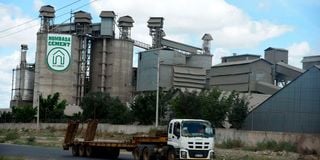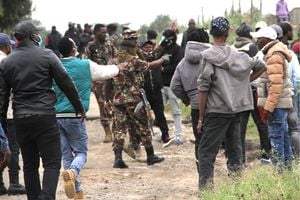
Mombasa Cement Ltd.
In 2004, the National Social Security Fund (NSSF) began selling off large parcels of land it owned in Mavoko, Machakos County, a move that helped give birth to Mombasa Cement Ltd.
Mombasa Cement first acquired L.R. number 27159, measuring 50 acres, in September 2004.
The NSSF offered to sell Mombasa Cement an adjoining parcel of land, L.R. number 11895/50, measuring 7.4 acres. On September 26, 2006, Mombasa Cement paid a 10 per cent deposit for the 7.4 acres of land before paying the balance two years later.
The company that would become Kenya's second-largest cement producer, had found a home. It developed a plant on part of the 50-acre plot, with some operations sneaking onto the 7.4-acre land.
But 16 years later, the 7.4-acre plot is a potential precedent-setting decision in the Supreme Court, as Mombasa Cement has accused three brothers of forging ownership documents to claim the land, which is currently valued at over Sh350 million.
Mombasa Cement has been locked in a bitter legal battle with brothers Harish Ramji, Bharat Ramji and Ashvin Ramji over the 7.4-acre land since 2010.
The battle has taken twists and turns as it snaked its way from the High Court, where Mombasa Cement won, to the Court of Appeal, where the Ramji brothers were victorious, and finally to the Supreme Court, which has been asked to make a final determination of the legal owner.
Interestingly, the NSSF has never been involved in the case, even though both sides in the war claim to have bought it from the pension fund.
As the case heads to the Supreme Court, the Ramji brothers have filed a separate case against the Directorate of Criminal Investigations (DCI) to stop the forgery investigation and subsequent prosecution.
The DCI wants to charge the Ramjis for allegedly forging land transfer documents to acquire the disputed property.
But the brothers petitioned the Kiambu High Court to stop the planned prosecution, arguing that the ownership dispute had been settled by the Court of Appeal.
On July 24, the Kiambu court dismissed the petition, stating that the Court of Appeal had not considered the forgery allegations and that the Ramji siblings were entitled to a fair trial in which they could present their evidence to prove their innocence.
The siblings have since challenged the Kiambu decision to the Court of Appeal. A hearing is scheduled for August 27, where judges will decide whether to suspend the High Court's decision pending a final ruling.
The Ramji brothers fired the first salvo in 2010, claiming they were the rightful owners as trustees of Golden Terrace Ltd.
They claimed that the NSSF had allotted 120 acres of land to Golden Terrace in 2006 and that any other transaction involving the property was illegal. The disputed 7.4 acres are within the land claimed by Golden Terrace from the NSSF.
The Ramjis added that before the land could be transferred to them, another company, identified as Harp Investco, filed a High Court case also claiming the property and seeking to stop the NSSF from dealing with anyone else.
It appeared that the NSSF had entered into several sale agreements for large tracts of land it owned in Mavoko.
Harp Investco's case delayed several pending sales, including Mombasa Cement's already initiated move for the 7.4 acres.
An out-of-court settlement was reached on June 16, 2010 in which all parties to the case agreed that all buyers, including those not restrained by the suit, would share the land proportionately.
The settlement was entered as a court order on the same day.
Mombasa Cement said in its court papers that it had settled the balance of the purchase price with NSSF on the basis of this agreement.
By the time the case was settled, NSSF had insisted on increasing the cost from Sh6 million to Sh8.7 million. Mombasa Cement complied.
Two months later, the Ramjis filed their High Court case against Mombasa Cement and the NSSF, claiming the 7.4 acres.
The brothers argued that Golden Terrace had transferred its interest in the land to them in January 2010 -- six months before the out-of-court settlement that ended the impasse between the NSSF and several buyers.
The Ramjis added that the NSSF transferred ownership of the 7.4 acres of land to them on May 27, 2010 for Sh6.3 million. This was one month before the settlement of the Harp Investco case.
In response, Mombasa Cement argued that the transfer to the Ramjis was illegal because the brothers should have known that it had already entered into a purchase agreement with the NSSF.
The company also accused the NSSF of acting fraudulently by offering to transfer the 7.4 acres to the Ramjis while still demanding money from Mombasa Cement for the same land.
Under cross-examination, Harish Ramji said he did not know how much Golden Terrace had paid the NSSF in exchange for the land.
Harish added that the three brothers entered into a deal with NSSF in 2006 to buy 120 acres for Sh102 million.
He insisted they paid a Sh10.2 million deposit on December 12, 2006, but the Harp Investco case hampered completion.
The Ramjis did not provide any evidence that they had paid the deposit.
When asked why the transfer was dated a month before the settlement of the Harp Investco case, Harish claimed that he had reached an agreement with other parties claiming the property which allowed the process to continue.
Interestingly, the documents produced by the Ramjis in court showed that the transfer documents were submitted to the Ministry of Lands at 4.08pm on May 27, 2010, but that the process was completed at 11.50am on the same day.
This meant that the transfer was registered several hours before the documents were submitted to the Ministry of Lands.
In the transfer document, the NSSF stated that it was transferring ownership of L.R. number 11895/48. The disputed land is located on L.R. number 11895/50.
The Ramjis insisted that Mombasa Cement had failed to produce a contract of sale and that the company's claim was therefore not legally valid.
But Mombasa Cement argued that its purchase of the 7.4 acres was based on the outcome of the Harp Investco case.
Kennedy Kaburi, who was a director of Golden Terrace, told the court that the company had transferred its interest in the land through a gentleman's agreement, so no documents were signed and there was no correspondence between his company and the Ramjis.
Mombasa Cement, through Rushen Delwash, told the court that its payment of the balance of the purchase price after the settlement of the Harp Investco case was at the request of NSSF's lawyers -- Wetang’ula, Adan & Makokha Advocates.
The cement company submitted to the court all correspondence and payment documents relating to its dealings with the NSSF.
In her ruling, Judge Kossy Bor found that the Ramjis had failed to explain why the NSSF had only transferred 7.4 acres to them when documents produced in court indicated 120 acres.
She added that the brothers had not provided any evidence of payment for the land, either by themselves or by Golden Terrace.
“One would have expected the assignment to cover the entire 120 acres stated in the sale agreement or evidence of how the decision to transfer only 3.043 ha to the plaintiffs was arrived at. Further, the plaintiffs did not adduce evidence of payment of the consideration indicated in the transfer of the suit land to their names,” Justice Bor said in her judgment.
Aggrieved by this decision, the Ramji brothers challenged it in the Court of Appeal.
At the Court of Appeal, judges Daniel Musinga, Hellen Omondi and Grace Ngenye-Macharia ruled that the discrepancies in the documents submitted by the Ramji brothers were clerical errors.
“It seems rather obvious to us that there was a clerical error in the preparation of the transfer document in making reference to L.R. Number 11895/48 when the subject matter in the entire transfer was L.R. Number 11895/50. Such an error could easily have been rectified under section 59 (2) of the Registration of Titles Act,” the judges said.
The Court of Appeal further held that no evidence had been adduced to show that the Ramji brothers knew or ought to have known that NSSF had already entered into an agreement to sell the land to Mombasa Cement.
The judges said there was no evidence of fraud in relation to the difference in the acres transferred.
As for Mombasa Cement's reliance on correspondence with NSSF and the settlement in the Harp Investco case, the Court of Appeal said that a sale and purchase agreement is paramount and therefore its absence gave the Ramji brothers an advantage.
“We therefore find that the learned judge erred in law by failing to find that the 1st respondent’s (Mombasa Cement) counterclaim for the suit property could not be sustained in the absence of a sale agreement,” the judges added as they ruled in favour of the Ramji brothers.
As a consolation, the Court of Appeal ruled that the NSSF must refund Mombasa Cement, with interest from 2006 until payment in full.
Mombasa Cement has now taken the case to the Supreme Court, the final frontier, where the ruling will not only close the matter but also set a precedent for similar disputes.









